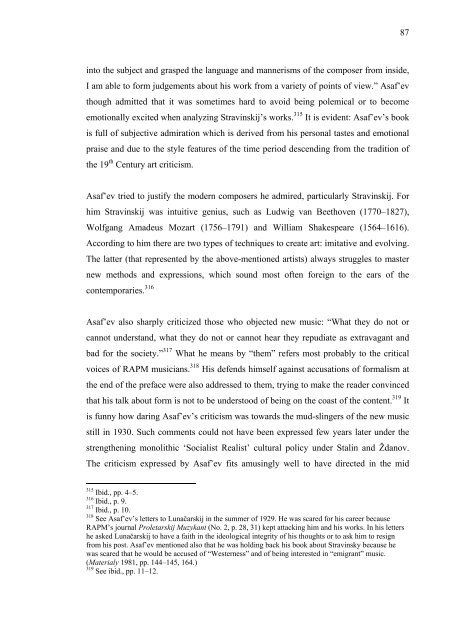Boris Asaf'ev and the Soviet Musicology - E-thesis
Boris Asaf'ev and the Soviet Musicology - E-thesis
Boris Asaf'ev and the Soviet Musicology - E-thesis
Create successful ePaper yourself
Turn your PDF publications into a flip-book with our unique Google optimized e-Paper software.
into <strong>the</strong> subject <strong>and</strong> grasped <strong>the</strong> language <strong>and</strong> mannerisms of <strong>the</strong> composer from inside,<br />
I am able to form judgements about his work from a variety of points of view.” Asaf’ev<br />
though admitted that it was sometimes hard to avoid being polemical or to become<br />
emotionally excited when analyzing Stravinskij’s works. 315 It is evident: Asaf’ev’s book<br />
is full of subjective admiration which is derived from his personal tastes <strong>and</strong> emotional<br />
praise <strong>and</strong> due to <strong>the</strong> style features of <strong>the</strong> time period descending from <strong>the</strong> tradition of<br />
<strong>the</strong> 19 th Century art criticism.<br />
Asaf’ev tried to justify <strong>the</strong> modern composers he admired, particularly Stravinskij. For<br />
him Stravinskij was intuitive genius, such as Ludwig van Beethoven (1770–1827),<br />
Wolfgang Amadeus Mozart (1756–1791) <strong>and</strong> William Shakespeare (1564–1616).<br />
According to him <strong>the</strong>re are two types of techniques to create art: imitative <strong>and</strong> evolving.<br />
The latter (that represented by <strong>the</strong> above-mentioned artists) always struggles to master<br />
new methods <strong>and</strong> expressions, which sound most often foreign to <strong>the</strong> ears of <strong>the</strong><br />
contemporaries. 316<br />
Asaf’ev also sharply criticized those who objected new music: “What <strong>the</strong>y do not or<br />
cannot underst<strong>and</strong>, what <strong>the</strong>y do not or cannot hear <strong>the</strong>y repudiate as extravagant <strong>and</strong><br />
bad for <strong>the</strong> society.” 317 What he means by “<strong>the</strong>m” refers most probably to <strong>the</strong> critical<br />
voices of RAPM musicians. 318 His defends himself against accusations of formalism at<br />
<strong>the</strong> end of <strong>the</strong> preface were also addressed to <strong>the</strong>m, trying to make <strong>the</strong> reader convinced<br />
that his talk about form is not to be understood of being on <strong>the</strong> coast of <strong>the</strong> content. 319 It<br />
is funny how daring Asaf’ev’s criticism was towards <strong>the</strong> mud-slingers of <strong>the</strong> new music<br />
still in 1930. Such comments could not have been expressed few years later under <strong>the</strong><br />
streng<strong>the</strong>ning monolithic ‘Socialist Realist’ cultural policy under Stalin <strong>and</strong> Ždanov.<br />
The criticism expressed by Asaf’ev fits amusingly well to have directed in <strong>the</strong> mid<br />
315 Ibid., pp. 4–5.<br />
316 Ibid., p. 9.<br />
317 Ibid., p. 10.<br />
318 See Asaf’ev’s letters to Lunačarskij in <strong>the</strong> summer of 1929. He was scared for his career because<br />
RAPM’s journal Proletarskij Muzykant (No. 2, p. 28, 31) kept attacking him <strong>and</strong> his works. In his letters<br />
he asked Lunačarskij to have a faith in <strong>the</strong> ideological integrity of his thoughts or to ask him to resign<br />
from his post. Asaf’ev mentioned also that he was holding back his book about Stravinsky because he<br />
was scared that he would be accused of “Westerness” <strong>and</strong> of being interested in “emigrant” music.<br />
(Materialy 1981, pp. 144–145, 164.)<br />
319 See ibid., pp. 11–12.<br />
87

















